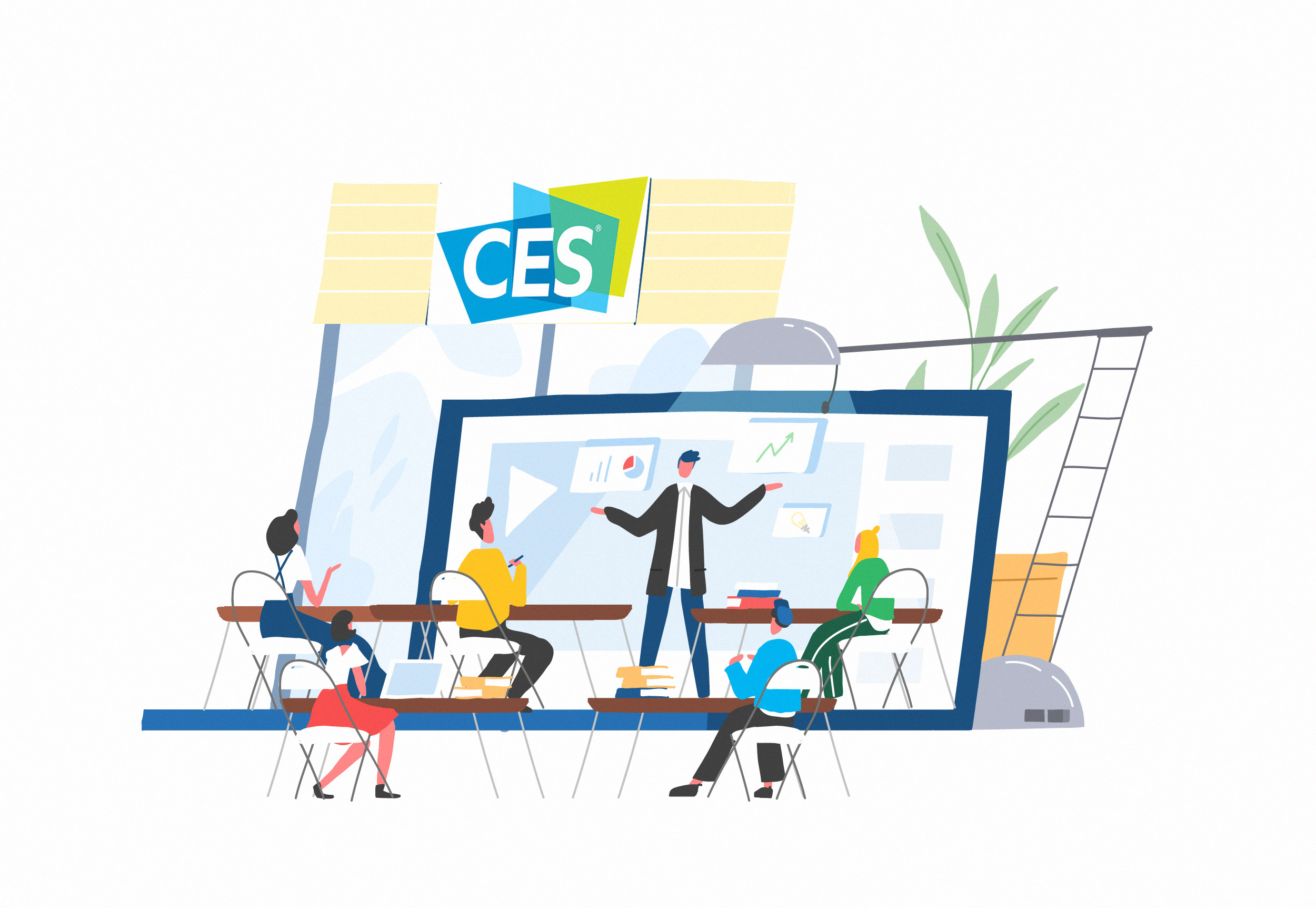How to Own Your Next Industry Event and Grow Your Brand

If you’re like me, you feel a little knot in your stomach every time you have to attend a conference or tradeshow. Wait, I have to deal with real people and not a Slack channel? Say it ain’t so! But lately, I’ve come to realize that these are exactly the kind of opportunities to lean into to grow my brand. And yes, you can do it too.
But let’s face it – the overcrowded showroom floors, the long presentations, the bland panel discussions, the “networking” time that everyone knows is really for socializing… it can be a dizzying experience. It’s no wonder you decided that your brand should skip out on it altogether. So much can go into attending a conference, and it can too often feel like little was gained from the experience. Plus, the food is usually terrible.
But perhaps you have the wrong approach; I know I did for many years. Despite all the quirks, industry conferences and events have real value. They’re where industries come together—competitors, partners, newcomers, and ancillary players. They’re crawling with potential customers, clients, vendors, and partners.
Often, they are where new products, services or brands are launched. And, many times speakers dive into important issues that affect the entire industry, and you actually learn something. Imagine that!
As a brand, especially a relatively new one, it’s smart to capitalize on any (good) opportunity to grow your mindshare. If done right, latching onto popular industry events can not only get your name out there, but also position you as a thought leader and the desired firm to associate with.
And sometimes, that can be without even attending the event at all.
As with any marketing endeavor, no approach is one-size-fits-all. Your company’s size, budget, maturity, market position, and overall marketing and growth strategy all need to be considered when deciding how to approach an industry event.
If you’re ready to dominate an industry event, and more importantly, parlay that domination into meaningful brand growth, we’ve got the playbook for you.

The Before
Step 01: Pick The Right Event
It might be your dream to host a keynote at SXSW, CES or Cannes Lions, but the truth of the matter is that these major conventions are very difficult places to penetrate meaningfully. That doesn’t mean that your brand shouldn’t have a presence at major, cross-industry events. But getting time on the main stages can be costly, and oftentimes these events are so big that the signal can be lost amongst the noise. there’s almost no consistent thematic throughline for your business to take advantage of.
If you’re a startup, it’s understandable to want to pour everything into going to one of the big events and try and make a big splash. But it’s also valuable and more strategic to start smaller. Almost every industry, from retail to finance to insurance to logistics have their own individual events throughout the year. These are the ones to target for your warm-ups.
Sometimes these can be great stepping stones or practice runs for attending bigger events. And they’re almost always more relevant to your business anyway—rather than fighting for attention among the biggest companies and celebrity guest speakers, the focused events are places where authentic industry types are present. They’re where your brand can really shine.

The During
To Speak or Not To Speak?
From a lead generation perspective, speaking at industry events is a top-tier activity that positions you as an expert. If you have the budget, getting a speaking arrangement can be an effective way to build awareness for your brand, as well as yourself as a really smart person who knows their sh*t. Whether it’s booking a senior leader on a panel discussion, or hosting your own presentation or discussion, getting your brand name to appear in the official program is never a bad thing.
However, if you’re going to go this route, there are a few things to keep in mind:
Pick a Good Title, or Perish: If you’re hosting your own presentation, you must stand out amongst the often-long schedule of speakers and presentations. Instead of “The Key to Security: Encryption in Today’s Digital Landscape”, go with “How to Keep Your Sh*t Secure”. Ok, so maybe you’re in analytics and the vibe is a little more buttoned-up, so you don’t want to cuss. But you get the idea. If it makes you slightly uncomfortable, you’re on the right track.
A Good Sales Pitch Doesn’t Feel Like a Sales Pitch: The easiest way to get your audience zonking out (or worse, walking out) of your presentation is to present your usual business pitch, along with your standard Keynote and case examples. People don’t come to an industry event to feel like they’re in a meeting.
Instead, find out-of-the-box, engaging ways into the topic you want to hit: Compare your brand story to a well-known historical event, myth, or fairy tale; make a connection with pop culture, using recognizable images and videos from modern stories. These types of approaches not only help you stand out from the pack, but show the audience you’ve given your presentation some love, and value their time.
Make Conversation: Involving the audience throughout can be tricky, but it pays off. Aside from the usual, played-out “So, I think we have a minute or two for questions!” at the end, try asking some “raise your hand if…” questions along the way (pro tip- get a microphone involved). Ask some interesting thought provokers, and get a true conversation underway. Back and forth discussion, even disagreement, is more valuable to all involved than a closed-off, yawn-inducing pontification.

Drive the Conversation on Social Media
At events, the conversation isn’t just happening within the convention center walls. It’s happening everywhere on social media as well. Major industry events are an opportunity for your brand to shine as the experts that you are.
Conferences present a number of opportunities for your brand, especially on social. As a company, you have expertise in your vertical. After all, your products and services solve problems for your customers—clearly, you must know a thing or two about the space in which you operate. Why not impart some of that knowledge in the public discourse? Share the love!
Remember, being a thought leader positions your company –and you– as an expert. And industry events are where the best, brightest and most influential minds in an industry coalesce.
Major industry events are an opportunity for your brand to shine as the experts that you are. Creating consistent event content for your brand’s social media accounts gives you a chance to drive the conversation. (And, here’s a little secret: you don’t necessarily have to be at an event to dominate the online conversation around it:).
Live Tweet It: If Twitter is important to your brand, designate someone to (selectively) report on the event throughout the day. Try creating visual quote cards of interesting bits of wisdom that are said on stage and on panels.
Show, Don’t Just Tell: For Instagram, take photos of the event space/host city, as well as any of your brand’s activation or presence on the ground. If you’re just reporting, find some other interesting activations that may be relevant to your business. This can be buttressed by video content—whether it be first-person driven diaries or interviews you conduct with other folks at the event.
Oh yeah, Facebook / Instagram it: Essentially anything and everything you create for the other platforms can be cross-posted to Facebook, too.
Be sure to use the event’s hashtag in all of your posts, and possibly even create your own brand hashtag for the event as a way to organize all your content. The best part? All of this content can be created very cheaply and efficiently (and who is not down with that).

The After
Keep the Convo Going
Sometimes, the best time to talk about an event is after it’s over. With a little remove, you can gain a clearer perspective on what really was important, and what was mere hype or didn’t live up to expectations. This is especially true at a show like CES, where big brands often stage huge product reveals, only to be one-upped by something totally off the wall from a small, previously unheard of brand. Recap content, such as “5 Things We Learned From [Event]” are effective as longer-form content or as condensed takeaways for social media.
Track Your Success
If you had a physical presence at an event, the immediate successes might be easier to spot. How many contacts did you make? Cards you handed out and received? Calls you have set up? From a social media standpoint, you’ll want to do a full analytic recap of which of your posts worked best, and why. The learnings you get will help inform your strategy for the next event.
TL;DR
Industry events and conventions may sometimes feel like overstuffed networking meetups best to be avoided. But, if done right, they provide a sweet opportunity to grow your brand and your voice as a thought leader. If you identify the right event, bag a speaker slot, and enlist your team’s support for your awesome content strategy, you can own share-of-voice, drive the conversation, and maximize the PR ROI.
With hard work and a little luck, your brand can be the star of the show.
If this article helped you, please help us by sharing it or recommending to a friend. Thank you!


